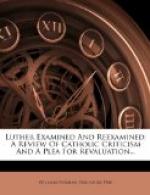Nobody should make Luther any better than he makes himself. Still, the question is pertinent whether violent polemics can ever be engaged in by Christians with a good conscience. Luther has asserted that, while he hurled his terrible denunciations against the adversaries of the truth, his heart was disposed to friendship and peace with them. (16, 1718 f.) Is a state of mind like this altogether inconceivable, viz., that a person can curse another for a certain act and at the same time love him? We think not. In his day this boisterous, turbulent Luther was understood, trusted, and loved by the people. After the publication of the Theses against Tetzel “the hearts of men in all parts of the land turned toward him, and his heart turned toward them. For the religious principles underlying the theses they cared little, for the arguments sustaining them still less. They saw only that here was a man, muzzled by none of the prudential considerations closing the mouths of many in high places, who dared to speak his mind plainly and emphatically, and was able to speak it intelligently and with effect upon a great and growing evil deplored by multitudes. It is such a man the people love and such a man they trust.” (McGiffert, Luther, p. 98 f.)
McGiffert has the right perception of the Luther of 1517-1519 when he describes him as “the awakening reformer,” thus: “He had the true reformer’s conscience—the sense of responsibility for others as well as for himself, and the true reformer’s vision of the better things that ought to be. He was never a mere faultfinder, but he was endowed with the gifts of imagination and sympathy, leading him to feel himself a part of every situation he was placed in, and with the irrepressible impulse to action driving him to take upon himself the burden of it. In any crowd of bystanders he would have been first to go to the rescue where need was, and quickest to see the need not obvious to all. The aloofness of the mere observer was not his; he was too completely one with




